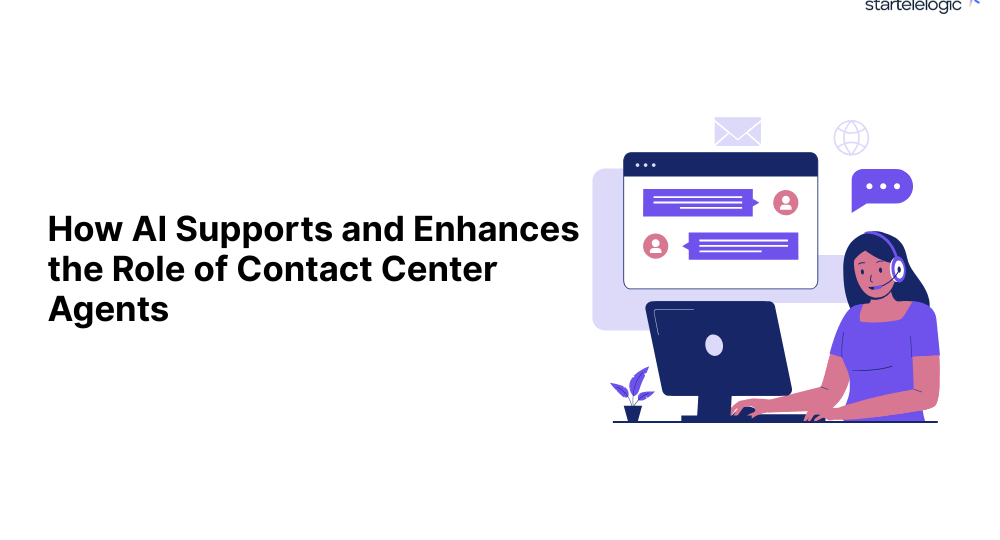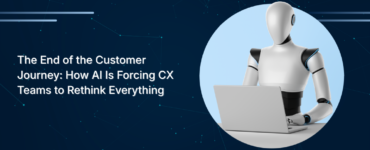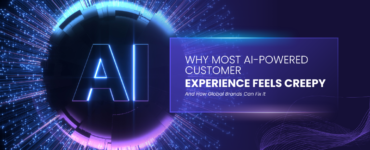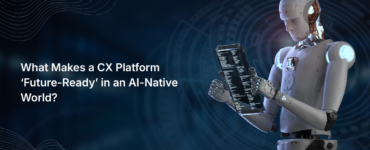Working in a contact center has never been easy.
Agents juggle high call volumes, emotionally charged conversations, and a maze of disconnected systems—often all at once. The pressure to deliver fast, empathetic support in this environment is immense, and it’s no wonder that burnout and turnover remain persistent challenges across the industry.
But a new path is emerging—one rooted not in replacing agents, but in empowering them. With the rise of AI agents, contact centers are transforming. These intelligent systems work behind the scenes to handle the complexity, freeing human agents to do what they do best: connect with people.
AI excels at processing information at speed, anticipating needs, and providing real-time answers. It can retrieve data from across siloed systems, summarize interactions instantly, and automate repetitive tasks—removing the friction that too often holds agents back.
Even more powerful is AI’s ability to act proactively: executing workflows, surfacing knowledge, and streamlining operations without being asked. As a result, the technology fades into the background—quietly enhancing performance while allowing agents to shine.
By reducing cognitive load, AI empowers human agents to focus on meaningful conversations, thoughtful problem-solving, and creating the kind of customer experiences that foster loyalty instead of frustration.
At the heart of this evolution is a simple truth: the best customer experiences happen when humans and AI work side by side.
The Evolving Role of Contact Center Agents
Today’s contact center agents operate in a high-pressure environment defined by complexity and rapid change. They must navigate high volumes of calls, increasingly complex customer issues, and the demands of omnichannel support—including voice, chat, email, and social media. At the same time, they’re expected to deliver consistently empathetic service while adhering to strict compliance guidelines and meeting productivity targets.
This evolving landscape requires more than traditional tools and manual processes. It calls for intelligent support systems that empower agents to be more effective, efficient, and customer-centric.
How AI is Revolutionizing Contact Centers
AI is transforming contact centers from reactive support hubs into proactive, data-driven environments that prioritize both efficiency and empathy. Here’s how:
1. Real-Time Assistance and Knowledge Delivery
AI tools can analyze customer interactions in real time—transcribing conversations, detecting sentiment, and suggesting responses or next-best actions as agents speak or type. Natural language processing (NLP) and machine learning models enable systems to understand customer intent and surface the most relevant knowledge or scripts instantly.
- Example: If a customer is upset about a delayed shipment, AI can instantly flag the emotional tone, retrieve the relevant order status, and suggest a response aligned with company policy—helping the agent resolve the issue more quickly and compassionately.
2. Intelligent Routing
Instead of routing calls randomly or strictly by availability, AI leverages customer history, sentiment scores, issue type, and agent skill sets to ensure every query is directed to the best-suited representative.
- Result: Shorter wait times, fewer call transfers, higher first-contact resolution (FCR), and better alignment between customer needs and agent expertise.
3. Automating Repetitive Tasks
AI-powered virtual agents and chatbots can handle common inquiries such as password resets, appointment scheduling, billing questions, or order tracking—tasks that typically consume a large portion of human agent time.
- Impact: Human agents are freed to focus on high-value, emotionally complex conversations that require critical thinking, empathy, and creativity.
4. Predictive Analytics for Proactive Support
AI analyzes historical customer interactions, purchasing behavior, and support patterns to predict potential issues before they occur. It can trigger automated follow-ups, personalized offers, or proactive outreach from a live agent.
- Scenario: A customer’s service contract is about to expire. AI flags this and prompts the agent to reach out with renewal options—turning a potential churn risk into a retention opportunity.
5. Personalized Training and Coaching
AI systems don’t just improve customer interactions—they also enhance agent performance. With tools that analyze call recordings, tone, script adherence, and customer feedback, supervisors gain deeper insights into individual agent strengths and areas for improvement.
- Capabilities:
- Real-time alerts when a conversation is veering off-track.
- Automatic scoring of calls for compliance and quality.
- Customized training modules based on performance analytics.
- Real-time alerts when a conversation is veering off-track.
Benefits for Contact Center Agents
AI integration transforms not only customer outcomes but also the daily experience of agents themselves:
- Reduced Stress: AI alleviates information overload and reduces manual workload by automating tedious tasks and delivering just-in-time information.
- Increased Engagement: With more time to focus on meaningful, relationship-driven interactions, agents feel more valued and fulfilled in their roles.
- Ongoing Skill Development: AI-powered feedback loops support continuous learning and career development, enabling agents to grow in both confidence and capability.
Striking the Right Balance: Human + AI
AI in contact centers isn’t about choosing between humans or machines—it’s about designing systems where both thrive. AI provides the scale, speed, and data-processing power that machines excel at, while humans bring emotional intelligence, critical thinking, and a nuanced understanding of customer needs.
The most effective contact centers of the future will be those that integrate AI not just as a tool, but as a teammate—one that enhances human strengths and complements human judgment.
Final Thoughts
As AI continues to mature, its role in contact centers will only grow more impactful. Organizations that embrace this shift early—investing in AI-powered tools and fostering a culture of human-AI collaboration—will be better positioned to meet rising customer expectations, improve operational performance, and elevate the agent experience.
In the end, it’s not about man versus machine. It’s about building a smarter, more responsive, and more human customer experience—powered by both.
Here are 5 frequently asked questions (FAQs)
1. Will AI replace human contact center agents?
No. AI is designed to complement, not replace, human agents. While it can handle routine tasks and provide real-time support, human agents are still essential for handling complex, emotional, and high-stakes customer interactions. The goal is to reduce agent workload, not eliminate their role—freeing them to focus on what they do best: building meaningful customer relationships.
2. How does AI improve the daily experience of contact center agents?
AI reduces the cognitive burden on agents by:
- Delivering instant knowledge suggestions during live calls or chats.
- Automating repetitive and time-consuming tasks.
- Providing real-time coaching and feedback.
- Offering predictive insights to help agents be proactive.
This support leads to lower stress, higher engagement, and more opportunities for skill development.
3. What types of tasks can AI automate in a contact center?
AI can handle a wide range of repetitive or data-driven tasks, such as:
- Password resets and order tracking.
- Appointment scheduling or billing inquiries.
- Summarizing call transcripts.
- Tagging and categorizing interactions.
This allows human agents to dedicate more time to complex, value-added conversations.
4. How does AI impact customer satisfaction?
AI enhances customer experience by:
- Reducing wait times through intelligent routing.
- Providing quicker and more accurate responses.
- Enabling proactive outreach before issues escalate.
- Supporting smoother, more personalized interactions.
By helping agents respond faster and more effectively, AI contributes to higher customer satisfaction and loyalty.
5. Is it difficult to integrate AI into existing contact center systems?
Not necessarily. Many modern AI solutions are designed to integrate with popular contact center platforms (e.g., CRM, helpdesk, voice systems) via APIs or native connectors. Cloud-based tools and modular AI components also make it easier to adopt AI incrementally, allowing organizations to see value quickly without a full overhaul of existing infrastructure.




